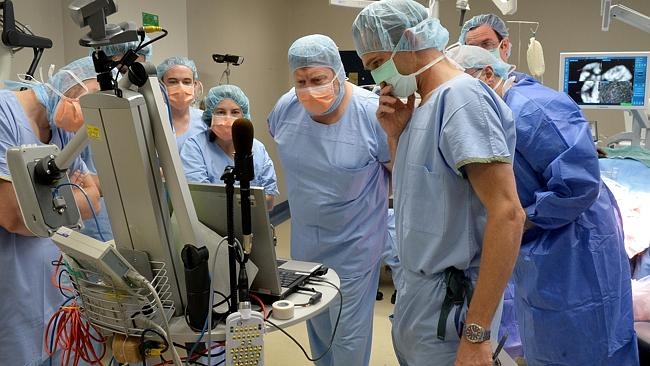
Free medical care will be scrapped as Australians are forced to pay $7 to see a doctor, get a blood test or an x-ray from next year as the government slashes $10.5 billion from health spending.
A trip to the doctor that results in a blood test and a prescription will burn a $56.70 hole in the pocket of a general patient from next year, pensioners will have to pay $20.80 for the same services.
The money saved from this and other cutbacks will be put into a $20 billion Medical Research Future Fund the government says will be the biggest in the world and it will be tasked with finding a cure for cancer and dementia.
“Health services have never been free to taxpayers so patients are being asked to make a modest contribution towards their cost,” Treasurer Joe Hockey said last night.
Public hospital funding will be slashed by $2 billion as the Abbott government reneges on Labor’s health reform deal with the states.
And the states will be given power to introduce a new charge for GP type hospital emergency department visits.
You’ll have to wait three years, not two, between Medicare funded eye check ups and the Medicare rebate for optometrist services will be cut.
Medicare rebates for specialist and all health services except GP care will be frozen which could leave patients facing higher charges as doctors increase their fees in line with inflation.
Funding for public dental services will be slashed by $390 million leaving state run public dental services in the lurch and hundreds of thousands of patients ill miss out on dental care.
More people will be denied a tax rebate for private health insurance as the government freezes the means test on the tax break for three years from July 2015.
While it will become easier for pensioners and those no receiving Family Tax Benefit A to qualify for the Medicare safety net that helps patients with large out of pocket expenses.
Families who receive the family tax benefit will have to spend around $46 more on health care before they qualify for the safety net.
The amount patients get back on their medical expenses under the safety net may fall when the government caps the amount it pays patients under the safety net scheme at 150 per cent of the Medicare schedule fee in a bid to rein overcharging doctors who took advantage of the scheme to increase their incomes.
Bulk billing will end from July next year when the government cuts the Medicare rebate paid to GPs, pathologists and radiologists.
This will force them to introduce new fee for basic medical services if they want to maintain their income.
The fee will hit all patients including one in five people whose doctor does not bulk bill because it will be achieved by cutting the Medicare rebate by $5.
Patients who see a non bulk billing doctor will see their out of pocket expenses rise from an average $27 to $32 under the change.
Bulk billed patients will be hit with a $7 charge for seeing a doctor, this is the amount doctors will have to charge if they want to keep certain government incentive payments.
General patients will have to pay the charge every time they see a doctor but pensioners will only have to pay the charge on ten visits to the doctor and parents will only have to pay the charge for ten visits for each child.
This same $7 charge will be added to the cost of blood and urine and other pathology tests (87 per cent are currently bulk billed) and X-rays, MRIs and other medical imaging tests (74.8 per cent are currently bulk billed).
The cost of seeing a specialist is set to rise after the government imposed a freeze on all Medicare rebates except GP payments from July this year.
This means when specialists raise the fees they charge their patients to keep pace with inflation the Medicare rebate patients receive will not increase leaving them with a larger out of pocket expense.
Fewer than one in three specialist services are currently bulk billed and patients are already paying more than $57 in out of pocket expenses to see them.
Even though it promised during the election to scrap labor’s means test on private health insurance the government has decided to increase the number of people who are caught by it.
It has done this by imposing a three year freeze on the income thresholds families must meet before they begin losing their tax rebate that helps them with the cost of health fund premiums.
This will mean thousands more individuals will lose some or all of their private insurance tax rebate as wage rises push their incomes over the $88,000 threshold for individuals and $176,000 for families.
Together these measures will save the government $1.7 billion over five years.
Source: News.com.au
